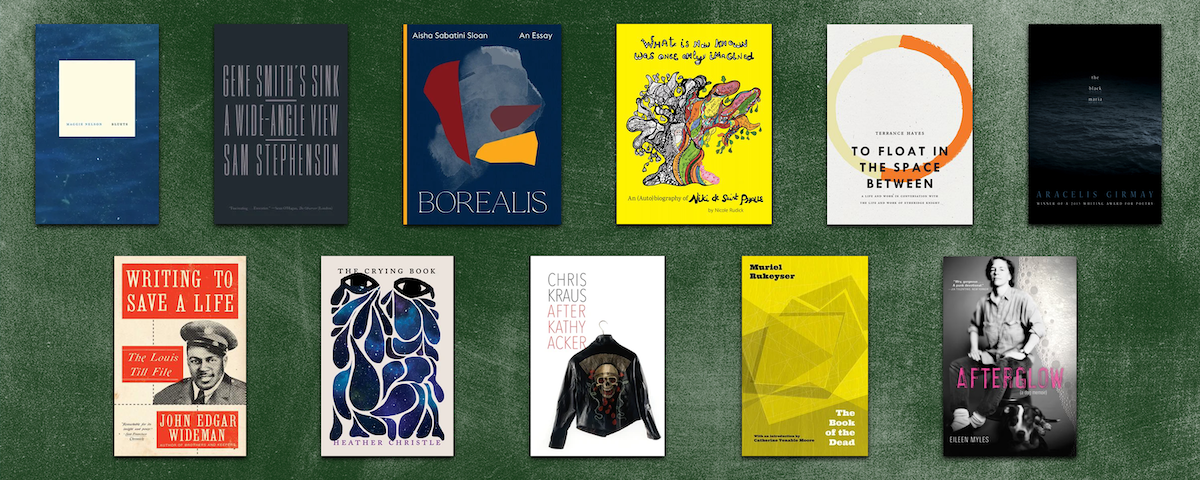I suspect I’ll like to teach this class (which I have not quite taught before, though I have taught some of the books) because I want to take this class. (One of the benefits of teaching creative writing, I’ve found, or am finding, or am getting better at finding, is that you can usually shoehorn whatever you’re working on into a semester’s worth of reading, writing, inquiry, etc. Even though this is in parentheses, I think it’s really important, if you’re able to figure that out, or pull it off. For instance, if you’re a writer, and you teach a class that has a writing component to it, it is pedagogically very sound to spend ten or 15 minutes of a 50-minute class, or 20 of an hour-plus class, writing. And in that way teach good and write sentences or lines.)
Which is to say, though I’ve read all of these books—some of them several times—I’m excited to read them in company, with this particular company. I’m looking to be instructed and inspired on how to think about writing hard about a specific topic (or whatever word we’re using these days), or to be instructed and inspired about how to write hard until you find your topic. Subject is the word. (Remember book reports?!) Turns out I think (I think!) I have a subject, and I am curious to revisit how Heather Christle and Maggie Nelson and Muriel Rukeyser and John Edgar Wideman, who also seem to have “a subject,” which really probably means “subjects,” go about it.
Additionally, I think we’ll be making things that none of us has made before—or at least I hope so. From the prompts, the collaborative weirdnesses that we’ll get into, the whoknowswhats. Additionally more, I’m just excited to be in a smallish, well-lit room with differently shaped comfortable chairs and a couch, with folks reading and thinking and making and trying stuff out and sharing work and food. I’m excited to see how what we read, what we think about, can not only make us more able to write what we need to write, or learn what we need to write, but can also maybe make us love one another better.
Course description
In this class we’re going to read and wonder about a handful of books that are examples of what we might call lyric research, by which I mean something like some weird blend of what we think of as “research” (tooling around in archives; photographs, documents, deep engagements with other writers, historians, artists, dogs, etc.) and of, oh I don’t know, an “I” or something. I think probably part of the objective of this class is to show us how thinking outside of ourselves, and thinking with other thinkers, can be useful and fun, provocative and stimulating. How we often (always?) think better with others, in some kind of community. Or maybe it’s a celebration and amplification of the fact that we always are thinking with others. Probably a bunch of other stuff too!
Also, of course, because these are all very interesting books (books I find incredibly beautiful and necessary and am excited to think about with you all), they might show us ways to consider a question we’ve been wanting to tool around in for a while but haven’t yet had an entry point. It might be that you learn how to think about an unspeakable heartbreak or love by writing about an oil spill or bakery or patch of woods between the 7-Eleven and highway in your town. I know I have some stuff I want to research and write about, so I’m excited to consider how these writers do what they do with you all.
Reading list
Maggie Nelson, Bluets • Sam Stephenson, Gene Smith’s Sink • Aisha Sabatini Sloan, Borealis • Nicole Rudick, What Is Now Known Was Only Once Imagined • Terrance Hayes, To Float in the Space Between • Aracelis Girmay, The Black Maria • John Edgar Wideman, Writing to Save a Life • Chris Kraus, After Kathy Acker • Heather Christle, The Crying Book • Muriel Rukeyser, The Book of the Dead • Eileen Myles, Afterglow




